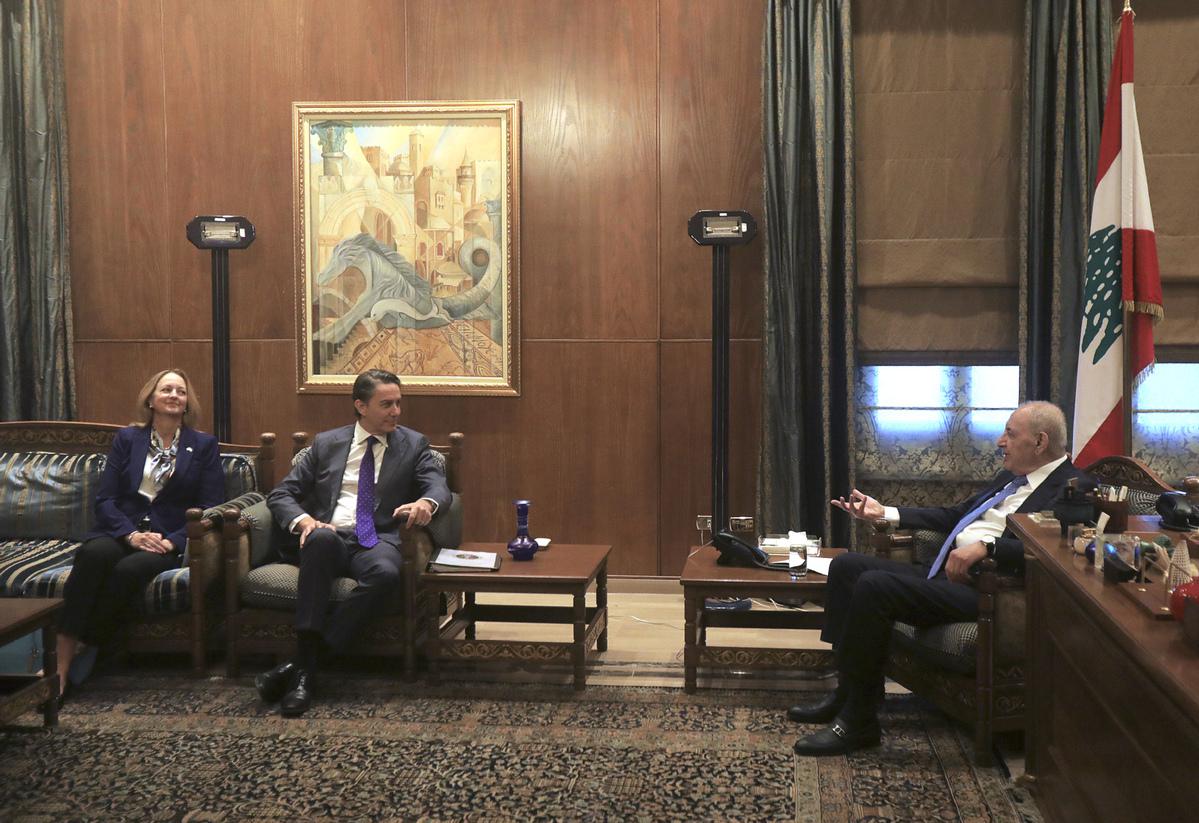
US envoy Amos Hochstein (2nd L) meets with Lebanese Parliament Speaker Nabih Berri (R) in Beirut, Lebanon, Nov 19, 2024. [Photo/Xinhua]
This is an editorial from China Daily.
That the US Navy's USS Abraham Lincoln aircraft carrier strike group in the Middle East left the region over the weekend after several months of operations there has been widely taken as an indication of easing of tensions between Israel and Iran following Israel's air strikes on multiple Iranian targets late last month.
It's also in line with the progress reportedly being made in cease-fire talks between Israel and Hezbollah that are being overseen by the United States. A US envoy told the media that an agreement to end the Israel-Hezbollah war is "within our grasp" after talks in Lebanon on Tuesday.
But despite that prognosis, Israel has not ceased its attacks on Hezbollah. While the cease-fire talks were going on, an Israeli air strike on what Tel Aviv claimed was a Hezbollah target slammed into a densely populated residential area in Lebanon's capital late on Monday, killing at least five people. Israel has dramatically escalated its bombardment of Lebanon since late September, with Israeli Prime Minister Benjamin Netanyahu vowing to severely weaken the Iranian-backed militant group that is in solidarity with the Palestinians during Israel's military campaign in the Gaza Strip.
Israel has also maintained its military aggression and weaponization of humanitarian aid supplies in the Palestinian enclave. On Tuesday Israeli attack helicopters and drones opened fire on Palestinian homes in central Gaza's Bureij and Nuseirat refugee camps, with residents searching through concrete debris to find any survivors. At least 50 Palestinians were killed in Israeli attacks on Gaza that day alone, according to the local health department.
And the looting of 97 of 109 aid trucks in Gaza by armed men over the weekend worsened an already severe food crisis in the Palestinian enclave, as the trucks were carrying food for the United Nations Relief and Works Agency for Palestine Refugees in the Near East and the World Food Programme. Although the identity of the perpetrators remains unknown, given the fact that the convoy, which was initially scheduled for Sunday, was ordered by the Israeli military to "depart at short notice via an alternate, unfamiliar route (on Saturday)", according to UNRWA, and Israel's tight control of the region, Tel Aviv's studied silence over "one of the worst" incidents of looting humanitarian aid under its nose is thought-provoking.
Notably, after the dust settled over the US presidential election, Netanyahu made no secret of the fact that he'd ignored US President Joe Biden's counsel and threats to withhold aid.
"The US had reservations and suggested that we not enter Gaza," Netanyahu revealed to the Israeli Knesset on Monday. "President Biden told me that if we go in, we will be left alone. He also said that he would stop shipments of important weapons to us. And so he did. A few days later, (US Secretary of State Antony) Blinken appeared and repeated the same things and I told him — we will fight with our nails."
The US ultimately withheld a single shipment of 2,000-pound bombs, but allowed all other weapons transfers to go on, which has given the Israeli leader the confidence that the tail can wag the dog.
Although he emphasized the importance of Israel making its own decisions, the next US administration is an external factor the Israeli leader has to take into account.
In stressing Israel must preserve its independence, Netanyahu is trying to make the most of the US' power transition period to maximize Israel's gains, which the Israeli leader believes is conducive to further tying the US' interests to Israel's in the region.
But in which way and to what extent that can be realized will depend on how effectively the Israeli leader can keep the next US administration on his hook.

 中文
中文



